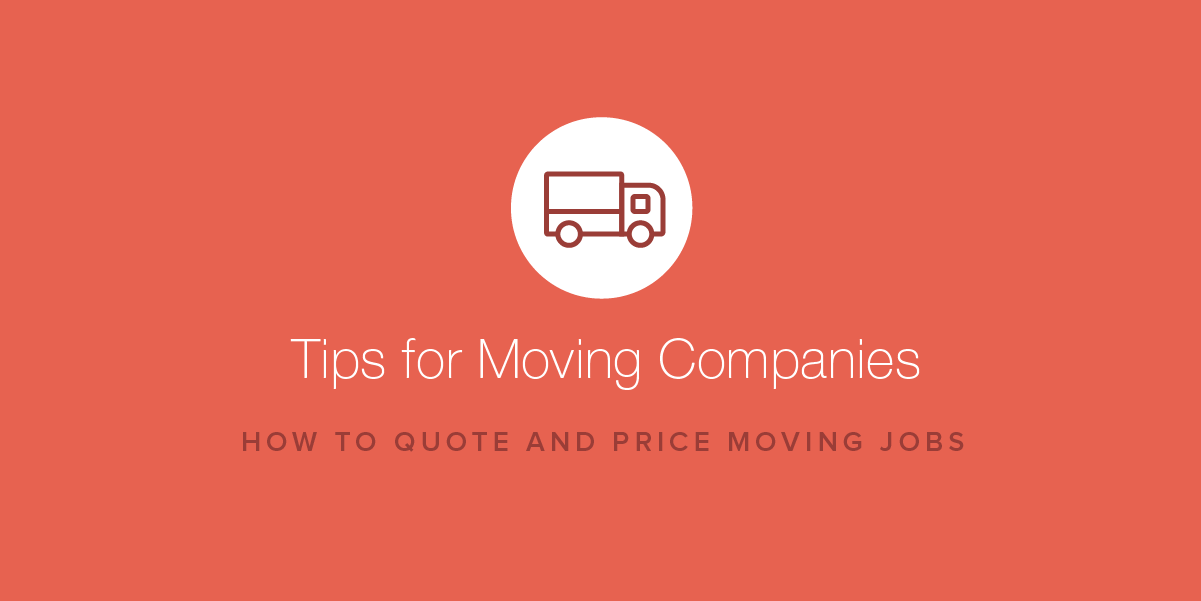How to Quote on Moving Jobs and Stay Profitable
- December 22, 2018
- By: Vonigo
This article about how to quote on moving jobs is by Kate Hart. Kate is a Removals and Relocation Manager with Fantastic Services.

Kate Hart
If you’re a running a service-based business, getting your price quotes right can either make it or break it. The process and formula behind precise job quotations is a key to business profitability and brand reputation.
So, read on and learn what are the aspects and pitfalls to consider when providing your customers with a quote.
We’ll guide you through all the job planning stages and talk about any potential miscalculations that you could inadvertently make.
What is a Quote?
The architect has quoted £90,000 to build a patio.” – Dictionary.Cambridge.org
A price quote is an official, and often final, piece of a written breakdown of the costs for a job/service you’re going to complete for a client. The document may also include your company’s general terms and conditions and ones that relate to the particular job in question.
These will usually be comprised of details like:
- Deadlines
- Payment terms and methods
- Conditional discounts
- Quote validity terms
- Separate tax entries
- Cancellation conditions
- Actions in the case of unpredictable events
- Rights and obligations for both parties and more.
The formal document should also include your business contact information, the date of creation and signature spaces. Once accepted and signed by the client, the quote becomes a legally binding agreement. It is similar to any other form of written contract. This means that your price quotation agreement is enforceable in a court of law, giving both you and your client that extra peace of mind.
A Quote vs. an Estimate
Government sources estimate a long-term 50 percent increase in rail fares.” – Dictionary.Cambridge.org
Although some may use the two interchangeably, there is a big difference between a quote and an estimate. It’s almost like the difference between a fixed price for a product, you’re interested in buying, and a subject-to-negotiation price tag on another product. The latter is open to discussion and modification.
So, it’s the same situation when it comes to providing your customer with an estimate for the work they may book you for. The client gets only a rough idea about what they should budget for.
He or she would also be prepared for a price increase, occurring mid-service or upon completion of the job. In that sense, a cost estimate has less legal status, as shifts in what’s been initially estimated are to be expected. In contrast, as we’ve already mentioned, a quote is final and if done correctly, it should factor any unanticipated changes in the fixed, end price.
Furthermore, your new job quote is an actionable and often final invitation to your client to proceed to do business with you. Using specialized software for moving companies could help you reduce your own costs and thus reduce the final price.
Here’s how it’s done.
How to Make Sure That Your Quote Looks Professional
If you’re yet to start a moving company, you may be tempted to quote over the phone after a brief discussion with the client about their requirements. But verbal quotes could leave room for misunderstandings, due to one of the following: inadvertent communication errors, intentional miscommunication, or ambiguity of the quote conditions.
So, to win new business, it’s always best if you provide your potential buyer with a clear, written price quotation. Check out the main points of how to write a quote for work:
- Have your company’s branding visible on your quote
- Keep your offer to the point, presentable and typo-free
- Make sure that your quote follows a logical structure
- Be courteous – greet your client and thank them for their interest in your price offer
- Ensure that all the aspects of your quote are clear and transparent.
Planning Your Moving Jobs Before Quoting
Before you get down to writing the quotation, you’ll need to have all the facts related to the job at hand. Only then will you have a chance to construct an accurate breakdown of the costs.
So, if you don’t spare the time to go into detail with the clients regarding their specific needs, your work planning process will be simply incomplete. This will result in an inaccurate quotation, which can lead to dissatisfaction, a monetary loss for your business, and even a lawsuit.
In general, when planning jobs, you’ll need to consider the scope of work, the work hours involved, the materials you need (and whether you’re the one who will supply them), the type of moving job — international, short & local or long-distance; if packing, moving supplies and storage would be included and so on.
Local or Long-Distance
For local moves, your pricing model will most likely use the quote pricing model while for long distance and international moves an estimate would allow more flexibility. The same way as rents change throughout the US, so does the cost of relocation depending on where you are and where you’re headed.
Furthermore, it’s a good idea if you anticipate any possible changes that may occur during the service itself, be it time-related (delays), issues related to the labor force (one or more employees gets sick, or a key tradesman has to leave on an urgent personal note).
The Key Aspects of Quote Formation
Now, let’s cover the factors that play a key role in conjuring up your job quote. Not all of these may be applicable to you, but they can help you get a clearer picture of what you should pay attention to when writing your quotation.
Materials
A precise calculation of the cost of materials is a must if they are included in the final price. Even if the client is getting their own materials, you may still need to use your own supplies (industrial fasteners, printing ink, brushes, protective sheets, etc.).
Labor
The main consideration here is to estimate how many people are needed to complete the job (by the deadline), as well as factor in their level of expertise and experience (you’ll pay your quality controller more than your newbie laborer).
Time
One of the hardest aspects to evaluate is the cost of your time. For instance, even if the service is not charged per hour, but per job, this doesn’t mean that you should take the whole time in the world to finish the project. Why? This most likely will result in dealing with a pretty vexed customer and a possible financial loss for your company in the long term.
Project Complexity
All jobs, even in the same field of trade, are different. So, consider how complex is your new client’s project and reflect this in your quote with a matching price tag. This way, you are not only placing a fair value on your staff’s skills and qualifications, but you’ll also get things right time wise (difficult projects will take longer, thus, they may cost more).
Third parties
Are you submitting papers for approval to various agencies on behalf of your customer? Do you need to pay motorway tolls or import taxes to the relevant authorities? Don’t forget to include the cost for those in your quote, of course!
Travel expenses
Fuel is not free, nor is it free to maintain your car, van or fleet of trucks. So, reflect any relevant means-of-travel costs in your quotation, if applicable. Also, think about what you can do on saving fuel.
Access to the property
Again, this may not apply to every service provider – say, the job is not done on site but in your office. But if the opposite is true for you, then, difficult access to your client’s home or the lack of a convenient parking spot may result in significant delays, especially if you have to deal with this problem for days over the entire duration of the project.
Job Revisions
This is a no-brainer. State clearly that any mid-job revisions will lead to modifications of the original quote.
Moving Companies – What Not to Miss in Your Quote
Let’s take a quick look at what a moving company should consider including in a price quote on top of some of the above-mentioned factors. Most removals service providers offer the option for packing assistance and the delivery of packing materials.
So, to make sure you earn new business from a potential client, offer choice in your quotation, as well as some tangible, value-for-money benefits.
Your price offer should factor in the difference in quality, durability, and versatility of packaging supplies, crates, and boxes. Another important aspect to consider is related to any additional insurance issues — if your trusted and reliable movers are doing the packing for the client, or if some of the customer’s belongings are of antique value.
Last but not least, international removals services will often have third parties involved in the process (e.g. customs authorities). So, remember to include any costs related to dealing with such.
Other specific jobs include people selling, buying and relocating to a new home at the same time. According to the experts, such occasions are extremely complex and pose many risks and if your moving company is on the job, you will have to foresee any unexpected obstacles, such as cross-country or cross-state fees.
![]()
Get Your Figures Right
Additionally, you should be on the ball when it comes to any overlookable expenses that are sometimes just far too easy to ignore.
- Prices: Have you quoted accurate prices or have you been counting on old quotations now that you have partnered with a new supplier? Is your business affected by the fluctuations of any exchange rates?
- Overruns: Have you factored in any cost overruns? Depending on the type of business you run, these may become a regular occurrence or not. So, learn to budget for any unexpected delays or other events that may increase the cost, from the very start, in order to maintain your business in a healthy financial position.
- Profit margin: Don’t forget to include (inconspicuously, of course) your fair profit margin in each quote you make. If you’re not careful, your profit may disappear into thin air within seconds due to your miscalculation of other costs.
- Preliminary costs: These apply to anything that you’ve spent to be able to provide the service. For example, packing services or materials might be considered a preliminary cost.
- Overhead: This is never included in your actual quote. But that doesn’t mean that you shouldn’t consider it in your price formation. You do occasionally buy new equipment or pay utilities to run an office, right?
- Time: Are you hitting a lengthy festive period while the service takes place? Will your employers work through the night or on a public holiday? Don’t forget to reflect these particular facets of the job process in your quote!
People Love Discounts – Give Them a Deal
Who wouldn’t like to get a deal for their hard-earned cash? Include a special discount, promotional code or some other personalized freebie for your valued customer.
This shouldn’t be done at the expense of your profit or the time and efforts of your staff, of course. On the contrary, if you’re a seasoned business person, your promotional offer could act as a cross-selling technique. It may bring you more business or even a new client.
In fact, it is a great way to build a fleet of returning clients. You know how every Youtuber nowadays asks for subscribers? Why wouldn’t you ask your clients? If they love the services that you provide and they are needing them on a regular basis, it is the perfect time to make a bond with them.
You can promote these options right in the quotation email. It serves as a way for your client to knock off a portion of the price, and for you to win them as a returning customer, also known as a customer with LTV – lifetime value.
Thrive on Your Client’s Feedback
Encouraging your customer to share their feedback with you will make your brand’s credibility go through the roof. So, invite them to tell you how you did. You can even reward them in some way for taking the time to give you their opinion.
Here is more information on why customer feedback is so important.
Any reputable and customer-oriented business should offer their clients several means of contact. That way the buyer feels confident and has no trouble reaching out to you to get a fast response.
It goes without saying that you can only improve your moving business, marketing, and quote formation strategies if you have regular and easy access to your customers’ feedback.
Now you know the importance of creating a price quote the right way. We wish you success in getting those clients queueing for your business.
Want to learn more about how moving software can help your moving business’ quoting, booking, scheduling and payments processes? Book a free, private demo of Vonigo.





